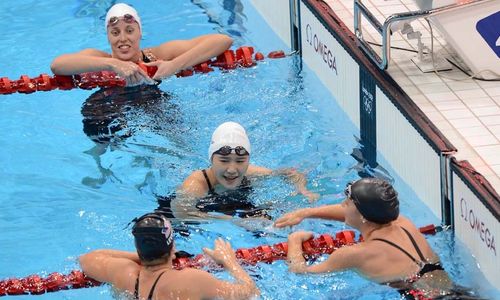Anger grows over alleged Olympic bias

A Chinese gymnast's failure to win gold has triggered a new round of anger among Chinese fans who believed their athletes were intentionally mistreated in a series of controversial incidents.
While agreeing that the Chinese side should defend the rights of athletes, analysts said the public should remain calm and not over-interpret referees' judgments or foreign media's suspicions.
When the games kicked off on July 28, many Chinese viewers were wowed by the opening ceremony, which was lauded as being humorous and full of human interest, and criticized the Beijing ceremony of four years ago for its extravagance and excessive seriousness.
However, the good impression was largely overturned halfway through the competitions, especially when Chinese gymnast Chen Yibing, nicknamed the "King of Rings," failed to defend his crown after being pipped by a Brazilian rival on Monday.
Chen's failure to snatch gold soon stirred up overwhelming anger in Chinese popular social networking websites, in particular Sina Weibo, with many suspecting behind-the-scenes dealings, as the gymnast from the host of the next games obviously took a step back on his landing while Chen put on an almost flawless show.
The unpleasant episode once again prompted people to connect it with previous matches including cycling, table tennis and badminton.
During a cycling race on August 2, Chinese women cyclists Guo Shuang and Gong Jinjie picked up a silver medal after being relegated from gold for violating the rules.
Meanwhile, the British cycling sprint team was accused of winning their gold medal by cheating after reports revealed that a member crashed on purpose following a bad start, but the International Olympic Committee said there was no reason to question the result.
An online survey launched by Chinese news portal ifeng.com showed that more than 265,000 people, or about 93 percent, believed Chen had been unfairly treated.
About 75 percent of participants held that many umpires have long been targeting Chinese players, while 16 percent thought athletes from other countries also experienced frustrating treatment.
But some foreign viewers provided another perspective.
"Everyone has a bias. Whether you are a Chinese, Canadian or German, you will always see things from a certain way that will be beneficial toward your country," Peter Koveos, a sports news copy editor with China Central Television, told the Global Times on Tuesday.
The judges make judgments. And by their judgments, the Chinese athletes are not as good. That's the simplest answer, said Koveos.
"You can't change the decision. Just move on," he said, adding that Chinese people are "too sensitive."
Qu Xing, director of the China Institute of International Studies, said it is normal that in many events, referees will make judgments out of their own preference, and "they will take stricter standards to you when you are prominently striking."
"It's unavoidable that we will encounter jealousy and even unexpected obstructions during the process of rising, as is the case in other fields," Qu said, adding that Chinese viewers should refrain from over-interpreting these incidents.
Zhang Yiwu, a professor of cultural studies at Peking University, said the interpretation of the Chinese public had a certain basis considering the constant obstructions Chinese athletes have been experiencing.
"The public should keep a calm mind. What we can do is try to be stronger to let others acknowledge and get used to your power," Zhang told the Global Times. "It's difficult to change the bias of others, while we can defend ourselves with facts."
Strong doubts over Chinese star swimmer Ye Shiwen have gradually subsided, highlighted by an apology from prestigious academic journal Nature on Monday.
The journal's website published an article titled "Why great Olympic feats raise suspicions" on August 1, which said Ye's gold-winning performance was "anomalous" and implied that the drug tests that she did during the competition could not rule out the possibility of doping.
The article soon fuelled heated discussions among the Chinese community. Wang Liming, an overseas student at the University of California, Berkeley even launched a campaign to boycott the magazine by collecting over 1,000 signatures from Chinese scholars.
Western media have a stereotyped impression of China, believing that Chinese athletes are relatively weak and have a tradition of cheating, said Wang.
"We need to make our voice heard on a firm basis while behaving well and trying to improve ourselves," he added.
"We acknowledge that the combination of errors … and the absence of a more detailed discussion of the statistics gave the impression that we were supporting accusations against her, even though this was emphatically not our intention," read the editorial note. "For that we apologize to our readers and to Ye Shiwen."
Qu said such a complicated situation is something China must face head-on, whether it is in the field of sports, the economy or politics, where it will also be pressured with all kinds of unfair accusations.
"What we can do is push forward our development regardless of outside voices," he said.
This Olympic Games has shown its uniqueness by involving mass participation of the public by virtue of new media platforms such as microblogs, where people express their opinions every day on diverse topics surrounding the games.
"It's a good phenomenon that the public has shown great passion for the event, because during their debates, they will become more rational on many issues, though some extreme opinions will still emerge," said Zhang.